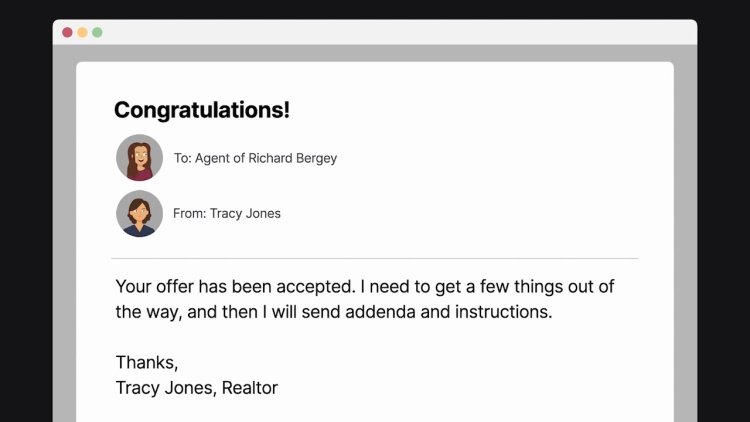Bergey v. HSBC Bank U.S.A.
Ohio Court of Appeals
2010 WL 2395506 (2010)
- Written by Craig Conway, LLM
Facts
Richard Bergey (plaintiff), through his real-estate agent, submitted a proposed purchase agreement for a house to Tracy Jones (defendant), the real-estate agent for the owner of the house, HSBC Bank, U.S.A. (HSBC) (defendant). Bergey’s offer was one of many submitted to Jones. All offers were then presented to HSBC for consideration. The highest bid was submitted by John and Susan Randolph. However, the Randolphs’ bid was contingent upon the obtaining of financing, while Bergey’s offer was for cash. Eventually, HSBC authorized Jones to accept Bergey’s cash offer for the house. Jones conveyed the news to Bergey’s real-estate agent via email and included an addendum and other instructions. Subsequently, the Randolphs informed Jones that the financing contingency could be removed from their offer. Jones relayed the information to HSBC. HSBC instructed Jones to withdraw the acceptance of Bergey’s offer and to instead accept the Randolphs’ offer. The sale was completed, and the Randolphs became the owners of the house. Bergey filed suit against HSBC and Jones for breach of and interference with contract, seeking damages, injunctive relief, and specific performance. HSBC and Jones filed motions for summary judgment. The trial court granted the motions, concluding that no breach of contract had occurred because HSBC did not actually accept Bergey’s offer, such that no contract was formed. Bergey appealed.
Rule of Law
Issue
Holding and Reasoning (Moore, J.)
What to do next…
Here's why 911,000 law students have relied on our case briefs:
- Written by law professors and practitioners, not other law students. 47,100 briefs, keyed to 997 casebooks. Top-notch customer support.
- The right amount of information, includes the facts, issues, rule of law, holding and reasoning, and any concurrences and dissents.
- Access in your classes, works on your mobile and tablet. Massive library of related video lessons and high quality multiple-choice questions.
- Easy to use, uniform format for every case brief. Written in plain English, not in legalese. Our briefs summarize and simplify; they don’t just repeat the court’s language.





